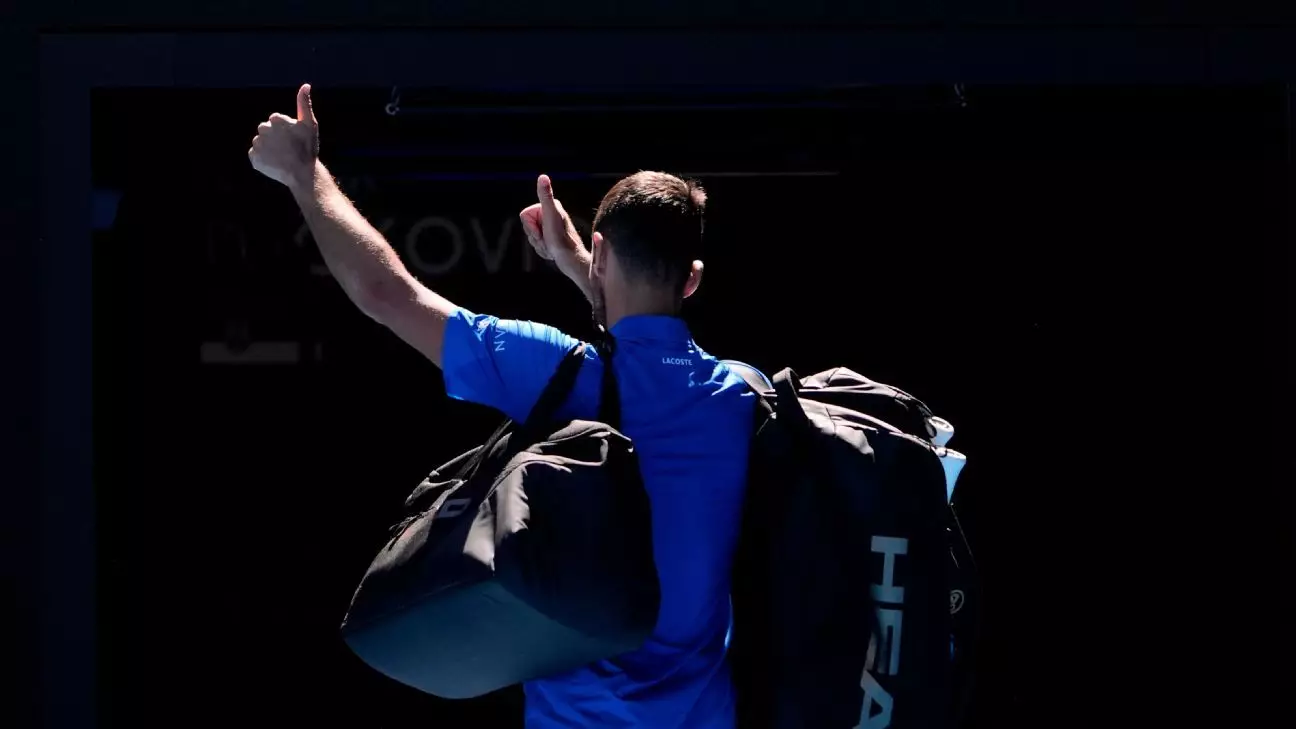In a stunning twist during the Australian Open semifinal, Novak Djokovic, a titan of tennis with 24 Grand Slam titles to his name, was forced to retire against Alexander Zverev. The match, which was anticipated to be a gripping contest, turned into a somber occasion as Djokovic succumbed to a muscle injury in his left leg after an intense first set that lasted a grueling 81 minutes. The packed Rod Laver Arena was abuzz with excitement, only to devolve into a collective hush as Djokovic, visibly hampered, made the heartbreaking decision to exit the match.
Djokovic had entered the match with his thigh heavily strapped, a precautionary measure that indicated he was not operating at full strength. The crowd’s initial excitement for the showdown swiftly turned into frustration as they booed the champion while he acknowledged Zverev’s victory, holding up two thumbs in a gesture that seemed to project resilience amidst disappointment. His words post-match reflected a deep sense of regret mixed with realism, revealing the heavy toll of injury on his championship aspirations.
Djokovic’s struggle with physical ailments has become a recurring theme in recent Grand Slam tournaments. The muscle tear sustained earlier in the week during his quarterfinal against Carlos Alcaraz has raised questions about the longevity of his career at such an elite level. “I tried everything I could,” Djokovic lamented, indicating that despite his efforts, including medication and physiotherapy, the pain had become unbearable.
His exit raises pertinent questions about the mental strain that accompanies physical injuries in high-pressure environments. Djokovic expressed awareness of the uphill battle he would face even if he managed to win the first set, suggesting that the ambition to compete can often clash with the realities of one’s physical capabilities. This incident forces fans and analysts alike to consider the toll that repetitive injuries can exact on an athlete’s mental fortitude and competitive spirit.
In stark contrast to the crowd’s negativity, Zverev took a noble stance during his on-court interview, urging the audience to refrain from booing a player who is incapacitated due to injury. His respect for Djokovic highlights the camaraderie and understanding that often permeates the world of professional sports. Zverev, who is set to play in his first Australian Open final against either Jannik Sinner or Ben Shelton, conveyed solidarity with Djokovic, emphasizing the unpredictability of sport and the respect owed to athletes facing injury.
“Him winning this tournament in the past with injuries shows his incredible skill and determination,” Zverev pointed out, further illustrating the high stakes of competitive tennis, where the line between triumph and defeat can blur under the pressure of physical limitations.
Djokovic’s injury during this tournament is emblematic of a troubling trend. With a history of injuries that have forced him to withdraw from significant matches—including a knee issue at the French Open last year—it appears that his own body is becoming an adversary in his ongoing quest for greatness. “The statistics are against me,” he admitted, acknowledging the injuries that have plagued him over the last few years.
Yet, Djokovic’s unwavering resolve is evident as he contemplates the future. His commitment to returning to the ATP tour is powerful, as he conveys the drive to overcome these adversities. “I will always strive to win more,” he asserts, hinting at a mindset focused on resilience rather than defeat.
Following his retirement, Djokovic has expressed intentions to work closely with medical professionals to expedite his recovery. His immediate future hinges on understanding the severity of his injury and making informed decisions regarding upcoming tournaments, including the Doha event. The transition from a champion’s mentality to a rehabilitative mindset is fraught with uncertainty, yet Djokovic’s determination paints a hopeful picture.
As tennis fans look forward to the conclusion of the Australian Open and beyond, they remain acutely aware that Djokovic’s saga is far from over. Beyond titles, his journey embodies the essence of resilience—a testament to the spirit of an athlete who has overcome countless obstacles in pursuit of greatness. The true narrative of Djokovic’s career will not only be written in the records he sets but also in his ability to rise again despite physical setbacks.

